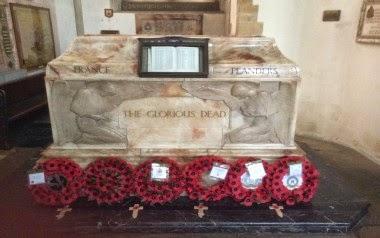 You may have noticed that the cenotaph has moved since last year. It now rests beside the Regimental Chapel. It was quite a job. The builders said that it was like working with lego. It came apart in 70 different pieces.
You may have noticed that the cenotaph has moved since last year. It now rests beside the Regimental Chapel. It was quite a job. The builders said that it was like working with lego. It came apart in 70 different pieces. On the cenotaph is an inscription. There are three words that echo words that are inscribed on the cenotaph in London, 'The Glorious Dead'.
I've done a bit of digging on the internet. The first time that I find the phrase in English literature is in a poem dated 1699. It speaks of the death of the Earl of Abingdon, but hints at a reference in Homer's Odyssey where Menelaus speaks of the calamitous fate that has befallen his friends as they fought for his cause overseas.
The passage that is referred to (and I use here Alexander Pope's translation of 1725).
'Still in soft intervals of pleading woeregardful of the friendly dues I oweI, to the glorious dead, for ever dearIndulge the tribute of a grateful tear'
Today, with the benefits of hindsight, we might wonder at Lloyd George's choice of 'the glorious dead' for the cenotaph in London.
Yes, the reference to Homer speaks of people who died in a far off land and links grief and glory. There is a bit of survivors guilt in Menelaus' speech. We survived and they died. And so to make sense of their death we glorify them. It is what we owe them, the least we can do for them.
But there was very little that was glorious about the Great War.
At first there was. People signed up because they wished to serve their country, and for glory. They were going to be the generation who defeated the Hun, and fought the war to end all wars.
And yes, there was victory. But victory for what? The whole thing had to be replayed in less than 31 years time. And at what cost? 18 million dead across Europe. 1 million British soldiers killed. A further 1.6 million wounded. Virtually every family was touched.
The war was not glorious. The course of the war was a mess, with generals who didn't know what to do, being pressurised to do something, anything to break the impasse, by the voices at home. And so they did the same old thing - bombarding, tunnelling and then sending men over the top. And each time the result was the same. In the end we did win, but that was not because of military victory, but because Germany crumbled from the center outwards.
And death certainly is not glorious. And certainly not death on the front line. I have been reading Forgotten Voices from the Great War. It is a collection of the reminiscences of the men and women who were actually there: who served in the trenches, in the staff teams, as soldiers, stretcher bearers, medics, land and munition workers.
So Private Richards, from the Royal Engineers, recalls, 'But then all of a sudden there was a violent explosion, and I was blown back about twelve yards. When I finally got up all I could see was smoke, and I could hear the cries and screams of the survivors. As I crawled towards them I could see what remained of the section that had been making these bombs. Some had been cut in two, some in three parts, legs and arms were strewn all over the place and there was that acrid smell of explosion. Well, all my romantic ideals of war completely vanished with that episode. The following day when I was given the job of going round with sandbags, collecting the pieces, we had to rescue some bits from telegraph wires where they’d been blown at great velocity, and we buried them in the common grave.'
Siegfried Sassoon writes in one of his poems (Suicide in the Trenches),
You smug-faced crowds with kindling eye Who cheer when soldier lads march by, Sneak home and pray you’ll never know The hell where youth and laughter go.
The glorious dead?
But perhaps the phrase is not completely out of place.
There is a sense in which they are the glorious dead, because society wished and (I am pleased about this) still wishes, to honor those who served and serve, and especially those who - in the middle of the hell, the mud, the fear, the wicked thoughtlessness (one man died in a dreadful way because he took a large gulp of rum only to discover it was strong disinfectant that had been placed in the bottles by someone who had stolen the rum), the evil, the bravado, the incompetence, the confusion, the ingenuity and the heroism - made the final sacrifice because their country called for it.
And we honor them, we give them glory, for that.
That is why, when there was a debate at the end of the war about how to honor the men who had fallen, as a rule they did not build triumphal columns or arches, they did not commission statues of men in heroic poses (you can see that elsewhere from other conflicts - look at the monument to the Boer war in the market place) but they wanted to focus on their sacrifice. And the debate was whether the memorials in the villages and towns should be like altars or like crosses. And they chose the cross over the altar, because the cross speaks of willing sacrifice, whereas the altar could speak of unwilling sacrifice.
The cross points us to the supreme sacrifice of all time. The sacrifice of one person for all people. The sacrifice of one who did not simply die an excruciating death, but who chose to take onto himself all our hell - the hell that we create and the hell that is in us - and to go to hell, so that we can be forgiven, and be saved from hell and from death. That is why when you walk into this church you walk in under the image of Jesus Christ on the cross. Because he died, he paid the price, we can come into the presence of God.
And because he made the ultimate sacrifice, he has been given the ultimate glory. Because he humbled himself and was obedient to death on a cross, God has raised him from the dead and given him the name that is above all other names, that at the name of Jesus every knee shall bow and every tongue confess that he is Lord to the glory of God the Father.
In the end, because the national memorial was to be for people of all faiths, and there was a debate in parliament about this, they chose not a cross or an altar, but a classical design - which again, our cenotaph echoes. It resembles a sarcophagus.
But there is something very important about the name 'cenotaph'. It means, literally, 'empty tomb'.
And that empty tomb points us to another empty tomb, and to a very different way in which the dead can be glorious.
Jesus speaks in our reading (John 12:20-28) of how a seed needs to die in order to bring life. He is speaking of his death and of his resurrection. Three days after he died, he came back to life. He appeared to his followers. And then he was taken away from them, but he told them that even though they could not see him, he would still be with them. And he says, 'whoever follows me, whoever is willing to live and die for me, will rise to eternal life'.
I cannot say that all who gave their life in the great war have eternal life. To say that would be to say that by giving your life in war you atone for your sins and enter glory. People have said that in the past and it has led to dreadful abuse by both the church and political rulers. You hear it being spoken by Jihadists today.
But what I can say is that, because of the sacrifice, death and resurrection of Jesus, any man, any woman or any child who calls out to him, who cries to him for mercy, who asks him to be their Lord, and who seeks to follow him, will receive his forgiveness and will be taken from death to glory.
That is why we can speak of the glorious dead.

